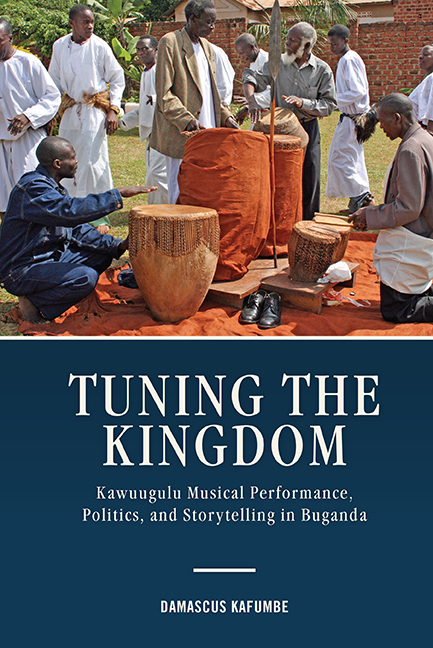Book contents
- Frontmatter
- Dedication
- Contents
- List of Illustrations
- Acknowledgments
- Note on Translation, Transliteration, and Orthography
- Note on the Musical Examples
- Preface: A Kingdom in and out of Tune
- Introduction: Kawuugulu Musical Performance, Politics, and Storytelling
- 1 The Kawuugulu Clan-Royal Music and Dance Ensemble
- 2 Kawuugulu and Intra-Clan Politics
- 3 Kawuugulu and Royal Politics
- 4 Kawuugulu and Inter-Clan Politics
- 5 Conclusion: A Performative Constitution
- Appendix A Glossary
- Appendix B Author Interviews
- Notes
- Works Cited
- Index
Preface: A Kingdom in and out of Tune
Published online by Cambridge University Press: 09 June 2021
- Frontmatter
- Dedication
- Contents
- List of Illustrations
- Acknowledgments
- Note on Translation, Transliteration, and Orthography
- Note on the Musical Examples
- Preface: A Kingdom in and out of Tune
- Introduction: Kawuugulu Musical Performance, Politics, and Storytelling
- 1 The Kawuugulu Clan-Royal Music and Dance Ensemble
- 2 Kawuugulu and Intra-Clan Politics
- 3 Kawuugulu and Royal Politics
- 4 Kawuugulu and Inter-Clan Politics
- 5 Conclusion: A Performative Constitution
- Appendix A Glossary
- Appendix B Author Interviews
- Notes
- Works Cited
- Index
Summary
Kawuugulu is arguably the oldest and longest surviving drum, song, and dance ensemble of the Ugandan Kingdom of Buganda. From precolonial times through missionization and colonialism and into the postcolonial era, the ensemble has managed, structured, modeled, and legitimized power relations in the kingdom. Enduring Muslim and Christian evangelization, British colonial rule, and post-independence violence and tyranny, Kawuugulu has served as an archive, “entextualization,” and aide-mémoire of Buganda's clan and royal history. Despite the ensemble's long existence and continuing political importance, however, it has received little academic or nonacademic documentation. For centuries, most narratives about Kawuugulu have remained the secrets of Aboobutiko, primary members of the Butiko, or Mushroom, Clan, and of individuals with whom the clan has close kinship. Through maternal ties to the clan established at birth, I have been able to gain unique access to Kawuugulu and its stories, making it possible for me to conduct the first indepth study of this centuries-old ensemble and its connections to sociopolitical life in Buganda.
I draw on oral and written accounts, archival research, and musical analysis to argue that Kawuugulu uses musical performance and storytelling that integrates human and nonhuman stories to sustain a complex sociopolitical hierarchy that interweaves and balances kin and clan ties in delicate tension with royal prerogatives. In referring to this phenomenon as “tuning the kingdom” I allude to its similarity to the process of tensioning or stretching (kuleega) drum hides. The process is ongoing, as the drums are always moving between, in, and out of tune. Also, as the Baganda say, Eŋŋoma gye bazireegera si gye zivugira: The drums do not sound as when they were tuned. As Kawuugulu adapts to the rapidly changing world around it, this book is important for cataloging how it has historically shaped principles of the three inextricably related domains that build the backbone of Kiganda politics: kinship, clanship, and kingship.
Buganda, the geographical focus of this book, is located in south-central Uganda, a sub-Saharan East African country that spans the Equator, south of South Sudan, east of the Democratic Republic of the Congo, north of Rwanda and Tanzania, and west of Kenya (see fig. P.1).
- Type
- Chapter
- Information
- Tuning the KingdomKawuugulu Musical Performance, Politics, and Storytelling in Buganda, pp. xxi - xxviiiPublisher: Boydell & BrewerPrint publication year: 2018

